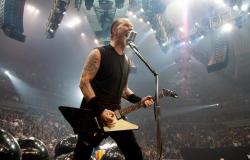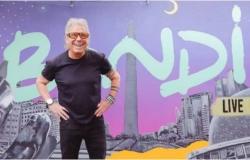This is the life of the biographer. In 1981, one sets out to write an urgent biography of the Beatles and during the following decades one has to amend oneself. That is what has happened to Philip Norman, who published the canonical “Shout!: The Beatles in Their Generation”, in which he made certain derogatory comments about McCartney (abusing the cliché of his charming and sociable character) and ignoring George. Harrison (and also insisting on his second-rate and discontented character) to praise what was, in his opinion, the creative genius, John Lennon. With Ringo there was not even room for controversy: he was just an extra.
The journalist “made peace” with McCartney in a biography, published in 2016, where he partly acknowledged his bad judgment, and then it was Harrison’s turn, of whom “George Harrison. Beatle in spite of him »(Libros Cúpula), a profile that delves into the multiple paradoxes of the «calm» Beatle. A man, as his biographer puts it, who was both extremely talented but undervalued, spiritual but evil-faced guru, philanthropist and cocaine addict. Welcome to the Harrison Paradox.
The subaltern
It will be impossible for him to remove the sanbenito. The guitarist has gone down in history as the subaltern, or, as he described himself, “the tourist class Beatle” on the other side of the curtain of preferential seating. Over time, of course, the vindication of his work (“Something”, “Here Comes The Sun”, among others, and the triple “All Things Must Pass”) has been absolute, and his legend, recognized . But the devil is in the details and, while the houses of Lennon and McCartney are today almost temples of pilgrimage in Liverpool, Harrison’s remains on the real estate market without a plaque that recognizes it.
Norman credits this fact in a biography that is rightly more concise than McCartney’s brick and that avoids the redundancy of the quartet’s career, but does not skimp on certain cruelties: Harrison was from the lower class (he was born in a house that had no indoor toilet, made for which he suffered Lennon and “Macca” jokes) and had an “old-fashioned name, like that old guy who still held up his pants with suspenders and wore a knotted scarf instead of a sun hat.” Minor pinches next to the words that the biographer himself left written in the “Times” of London, in Harrison’s very obituary in 2001, where he described him as a “serial womanizer” and “miserable idiot.” It was because of these adjectives that neither Olivia, Harrison’s second wife, nor Dhani, his son, refused to participate in the biography. But let’s continue.
Harrison’s life is, as biographical material, the most interesting of the Liverpool four, given that Lennon’s ended even more prematurely. He was the promoter of the sonority and oriental spirituality of the Beatles’ songs, and his contribution was constantly repressed by McCartney and Lennon, who thought that “their songs were not good”, and even by good old George Martin, who confessed his regrets for “having been quite a beast to George” when he replaced his parts with a piano riff. He was also the first to realize that being a Beatle wasn’t exactly paradise and the first to get tired of it. Paradoxes again: he was the victim, the sad apex of the most famous love triangle in the history of music (his wife, Patti Boyd, left him for Eric Clapton, his great friend), and the executioner: had an unfortunate affair with Maureen, the wife of Ringo Starr. He preached against material life while living in a huge Victorian mansion that, by the way, he took care of and renovated for 30 years and did not hesitate to mortgage it and risk losing it to finance the madness of “The Life of Brian”, by his friends Monty Python. . Without Harrison, we would not have such a movie monument.
It is fascinating, for example, that his mood drastically worsened when he discovered the Maharishi’s teachings and delved deeper into his spiritual side. “Her obsessive meditation on him, her incessant chanting and constant turning of the prayer wheel, far from bringing him the inner peace they promised, only seemed to put him in a bad mood and irritate him,” Norman writes. For Pattie Boyd, the purpose of spirituality “took some of the lightness out of his soul.” Of course, his role in the Beatles contributed to that bitterness. The first time she managed to have a song of hers appear on an A-side was “Something”, from the quartet’s latest album, “Abbey Road”. There are multiple testimonies that describe him as someone grim and sullen, a fact that may have contributed to his addiction to cocaine, which Harrison’s personal assistant recounts in the book: “In the mornings, Patti (Boyd) asked me : ”What do we have today, prayer beads or cocaine?”. If he was in his spiritual place, there was no way to reach him. But if he had done coke, he would want to drink and have a good party.».
In any case, it is unfair to reduce Harrison’s spiritual side to a parody. The guitarist managed to perfect and deepen himself, enough to stoically overcome the loving outcome of the affair between his wife and his best friend despite a succession of events – involving Ringo’s partner and Boyd’s little sister. – of delirious sordidness and pathos. He never got angry about what happened to anyone. “Those two were great friends,” Boyd said. And I was just in the middle.
Harrison got his musical revenge. His solo album “All Things Must Pass” sold much more than any of the rest of his colleagues’ individual works.
Not only that: he helped Ringo (the other secondary) achieve his “number one” with “It Don’t Come Easy” without wanting to appear in the credits. Perhaps he took it as a karmatic reward, although after that he did not receive so much positive criticism but rather condescension. With the advent of punk and the speed at which musical waves followed one another, he had not turned 40 and was already seen as an old man or a kind of outdated “hippie.” Harrison found inner peace, yes, after many years suffering from that anxiety. Few knew that the so-called “quiet Beatle” was, in reality, the one who suffered the most. Until, on November 29, 2001, after four years of new illnesses, he died of cancer.
One centimeter from death, the forty stab wounds
One of the most gruesome events in Harrison’s life took place in 1999, when he was recovering from throat cancer. He was in his 120-room Oxford mansion, where he had tightened security measures. It was December 30, the last hours of the millennium. Harrison heard noises inside the house and put on a robe over his pajamas. He found an intruder, whom he tried to calm down.
“Hare Krishna,” he snapped at the man, who began to scream. Harrison, fearing for his wife Olivia and his son Dhani, tried to stop him, but he stabbed him with the knife. Over and over again, up to 40 stab wounds to the torso and abdomen. Olivia entered the scene and hit the intruder with a metal lamp. He received some stab wounds, but continued hitting the assailant, who tried to escape by crawling through the garden. The police arrested him. Harrison’s life was miraculously saved. By an inch they missed his heart and by a few minutes he didn’t bleed to death. But he never recovered.






